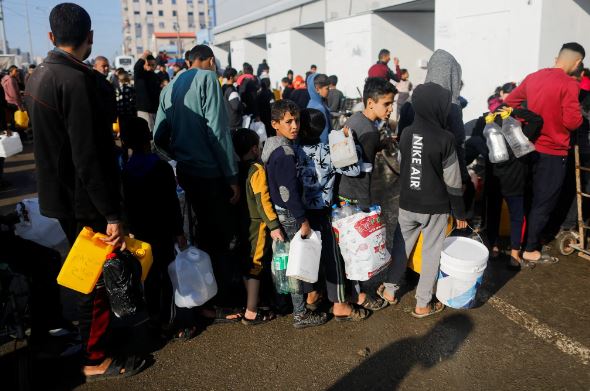In a distressing turn of events, the Gaza Strip is facing an unprecedented humanitarian crisis, with the threat of famine looming large over its 2.2 million residents. The situation, exacerbated by recent conflicts, has led to a severe shortage of food, water, and essential supplies, putting the lives of many at risk.
The Gaza Strip has become the epicenter of what experts are calling the most significant risk of famine since the establishment of the United Nations-affiliated global food-insecurity assessment two decades ago. The dire circumstances unfolded after Hamas launched a surprise attack on Israel on October 7, prompting intense air and ground assaults and a complete sealing of the territory. This blockade has left the population deprived of basic necessities.
Experts point out that the rigor, scale, and speed of the destruction of essential structures for survival, coupled with the enforcement of the siege, surpass any other case of man-made famine in the last 75 years. The people of Gaza, sealed within the territory, have limited recourse to seek food elsewhere, making this crisis unique and particularly dire.
The United Nations, through its Food and Agriculture Organization, has convened a panel of 30 experts from 19 agencies to assess the risk of famine in Gaza. The Integrated Food Security Phase Classification, which monitors food access in crisis zones globally, is sounding the alarm. If significant intervention does not occur, Gaza could reach famine levels as early as February.
Israel’s response to allegations of responsibility for the food shortage has been firm denial. Colonel Elad Goren, head of the Israeli agency overseeing policy for Palestinian territories, insists that there is a sufficient amount of food in Gaza. He places the blame on humanitarian organizations, claiming that if Gazans lack access to food, it is due to the failures of these organizations.
However, on-the-ground reports suggest a different reality. Before the conflict, about 500 trucks per day carried supplies, including food, to Gaza. Now, an average of only 127 trucks are permitted to cross the main Israeli checkpoint daily. The destruction of communications, shortages in fuel, and ongoing Israeli bombardment make aid distribution nearly impossible, according to the World Food Program and other agencies.
The blockade has also led to a situation where Gazans are relying solely on humanitarian aid for survival. The need for aid is exponentially higher, but challenges in receiving and distributing aid persist, including concerns about safety during distribution amid ongoing conflicts.
The debate surrounding the crisis in Gaza, whether a deliberate strategy to target civilians or an unintended consequence of Israel’s assault on Hamas, underscores the challenges of addressing such situations through international law. The prohibition of the starvation of civilians as a method of warfare is enshrined in international law, but applying it to situations like Gaza is complex.
Famines caused by deliberate choices of political elites are not new. However, prosecuting such offenses in international courts has been rare, with challenges in proving intent and navigating geopolitical considerations.
The international community’s response to the Gaza crisis is critical, with urgent calls for intervention and humanitarian aid. The United Nations Security Council’s adoption of Resolution 2417 condemning the use of starvation in conflict underscores the gravity of the situation. The world is watching closely, with hopes that declaring the risk of famine will prompt swift and significant action to prevent further suffering in Gaza.
As the crisis unfolds, it is a stark reminder of the fragility of peace and the urgent need for diplomatic efforts to address conflicts and their devastating humanitarian consequences. The lives of millions hang in the balance, and the international community must come together to avert a catastrophic famine in Gaza.

